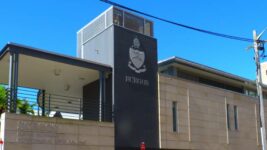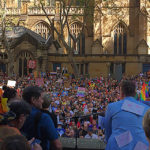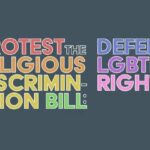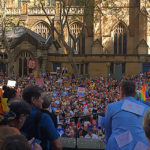Anglican Alumni Oppose the Religious Bill: An Interview With Ex-SCEGGS Student James Kong

The half-decade-long religious freedoms debate came to a head last week, when the prime minister’s prejudicial project, the Religious Discrimination Bill, was shelved after it looked like religious schools would lose their power to expel students on the basis of gender identity.
As the Morrison government forged ahead with the legislation that would override antidiscrimination protections across all jurisdictions to allow religious folk to make currently illegal remarks in the name of their faith, the attorney general put forth a deal to its opponents.
Michaelia Cash outlined that the government was willing to revoke the current law in the Sex Discrimination Act 1984 (Cth), which allows religious schools to expel students on the basis of sexual orientation, whilst they’d maintain the power to turf out transgender youths.
However, the majority of the upper house wouldn’t have it. And an amendment was passed that would repeal the ability to expel both gay and trans students, which led the Christian lobby to spit the dummy and push the government to call the entire show off, at least for the time being.
SCEGGS old girls speak out
The divisiveness of the parliamentary debate last week sparked ex-students from SCEGGS Anglican girls’ school in Sydney’s Darlinghurst to release a statement making clear that not all religious schools, and nor the entire Christian community, are harbouring such prejudicial views.
The statement points to a 2018 SCEGGS letter from the principal that outlines the school “welcomes all, regardless of age, race, sexual orientation or religion” and “students, staff, parents and alumni, who are members of the LGBTIQ community” are accepted at the institution.
The ex-students then went on to underscore that its unacceptable to discriminate against staff or students on the basis of being LGBTIQ – and in particular transgender people – under the guise of religious freedom.
The group of SCEGGS alumni further asserted that the bill’s statement of belief clause would extend discriminatory practices to the point where unmarried adults or members of minority religions could be subjected to prejudicial actions by religious schools that are currently outlawed.
A different shade of prejudice
Five Liberal MPs crossed the floor to support the Sex Discrimination Act amendment, however they’d called for it to be extended to revoking the law that permits religious schools to sack LGBTIQ teachers.
That amendment didn’t include school staff because the opposition didn’t support that measure.
Indeed, on the ABC’s Insiders program last Sunday, Labor Senator Kristina Keneally outlined that while her party would revoke the ability to expel students, it would rather send the law that permits the sacking of teachers to undergo the review of the Australian Law Reform Commission.
Sydney Criminal Lawyers spoke to ex-SCEGGS student James Kong, who’s currently studying to become a teacher, about his thoughts on the bill, why he thinks the government singled out trans students for ongoing discrimination, as well as what Labor might be up to on this issue.

Last week saw the shelving of the Religious Discrimination Bill. It’s now unsure whether it will ever come back.
The reason why it was placed on the backburner was Centre Alliance MP Rebekha Sharkie moved a motion calling for the law that permits religious schools to expel LGBTQ students be revoked. Crossbenchers and five Liberal ministers supported this, and so did the opposition.
However, while Sharkie wanted the amendment to include the prevention of the sacking of LGBTQ teachers, as did the Liberals who crossed the floor, Labor didn’t support this.
Given all this, James, what do you think about the shelving of the bill?
I’m glad the bill was shelved. Although the amendments that would protect LGBTQ students would have been a positive step. They still would be.
But it’s important to consider the bigger picture, which is that they were using this as leverage to pass a bill that would harm Australians on a wider scale.
Guaranteeing that students would not be expelled for being LGBTQ doesn’t justify everything else that the bill proposed to do, which included allowing discriminatory statements of belief and overriding existing protections for minority groups.
So, in light of that, shelving the bill is preferable – vastly preferable – from making those concessions. It’s just not worth it.
Attorney general Michaelia Cash arrived in parliament ready to propose a deal. This involved the government removing the ability to expel students based on sexual orientation, but schools would maintain the power to deny education on the basis of gender identity.
How do we account for the making of this distinction? And how is making it affecting the transgender community?
As a transgender man, I am intimately familiar with this distinction. It’s a distinction that’s commonly drawn between cisgendered queer people and trans people.
Part of the reason this distinction exists at all, is because the needs of the trans community are unique.
These include specialised medical care, such as hormone therapy and surgery, as well as legal affirmation, such as gender markers and name changing.
With these we also experience specific forms of oppression. That can be doctors denying us medical care based on being trans, when we’re prevented from accessing public bathrooms or being barred from sports teams of our gender.
On that note, just a few days ago, Tasmanian Senator Claire Chandler introduced a bill to ban transgender women from women’s sport.
But regardless of whether that bill passes or not, this is part of a wider trend that’s existed since the late 2010s, where trans identity has been this widely controversial topic discussed in public forums on all sorts of platforms.
So, every single time trans issues, like this, come to the forefront of the news it incites a new wave of anti-trans sentiment from detractors, some of which, like Chandler, hold political power.
When Donald Trump was in power, he took away trans rights that had come into being during Obama’s presidency. Trump took away rights, including the right to serve in the military and bathroom protections.
So, the trajectory of trans rights have not been linear, not in the slightest. And already, I’ve seen fellow trans people express fears that their rights will be taken away now that this bill is in public view.
It’s a tenuous time. But, then again, it never isn’t really.
You attended SCEGGS Anglican school in Sydney’s Darlinghurst. A group of ex-SCEGGS students have put out a statement of opposition to the Religious Discrimination Bill.
We’ve been discussing the pre-existing laws in the Sex Discrimination Act that allow religious schools to discriminate against staff and students.
But, looking at the RD Bill itself, why are you and others from the SCEGGS alumni opposed to it?
I can only speak for myself and my co-writers, but, put simply, the Religious Discrimination Bill would hurt a lot of people in a lot of different ways.
Looking particularly at the statements of belief section, religious schools, like Citipointe Christians College and Penrith Christian School, have already issued statements of belief that equate being LGBTQ with bestiality and paedophilia.
Statements of belief is a broad category. So, it could also allow medical professionals to deny LGBTQ or disabled people care based on religious grounds because the medical advice could fall under statements of belief.
Faith-based organisations could be able to fire or not hire employees from minority religions.
The government is presenting this statements of belief clause as a free pass to make “harmless” discriminatory statements, but they’re not acknowledging that making these statements is not harmless at all. It never is.
In fact, made by those in power – any sort of power, whether it’s medical power or in education – these remarks can directly destroy someone’s health or livelihood just by making those ostensibly “harmless” statements of belief.
There are so many bad things about that bill. That’s why we’re opposed to it.
Did the ex-SCEGGS students release the statements to make the point that, as it’s an Anglican school, not all religious schools are operating in the same way that the others you’ve just pointed to have been?
Yes. We thought that gathering people who have gone to SCEGGS would show that what these other schools are doing doesn’t speak for the whole Christian community. They don’t speak for all Christian schools.
But we wanted to make it really clear, especially to those students who are still at SCEGGS.
There’s that sort of tacit silence that lets it slide. We didn’t want to stay silent on this issue. We wanted to show those students that they will be supported, at least by us ex-students.
The Morrison government has been prioritising these laws the whole time it’s been in office. Why is this debate occurring now? And what sort of effect is it having?
In my understanding, the Morrison government is aware that they’re operating on a ticking clock, and it was a desperate push to get the bill through before the next federal election in May.
That being said, this debate was always going to happen because it’s been happening in some form in public for the last few years.
Scott Morrison promised to pass this bill. He made that promise in 2018, as a direct response to same-sex marriage being passed in 2017. This was a concession to those far-right groups that were upset because it passed.
This push and pull between the LGBTIQ communities and these anti-queer far-right groups hasn’t stopped since then. And in my opinion, it won’t stop for a long time.
It’s just another platform for polarisation, and for these anti-queer groups to do our community damage either in our own circles or on a national scale.
You’re studying to become a high school teacher. Labor Senator Kristina Keneally recently appeared on the ABC to say that her party would remove the law to expel students, but it wouldn’t revoke the power to sack teachers, rather it would send that law to be reviewed.
What are your thoughts on Labor taking this position?
Obviously, I disagree with this stance. I understand that Senator Keneally is a former teacher herself, so really, she should understand that teachers deserve not to have their livelihoods or their careers taken away over something that has no bearing on student safety or quality of teaching.
Education has historically been the way to teach students the norms and structures of society, and, in doing so, the discrimination and oppression that’s embedded within those structures.
So, if we send a message that LGBTQ teachers can be fired, or we’re not going to protect them but instead we’re going to send the law off to be reviewed, then we’re sending a message that reinforces these oppressive structures instead of supporting those fighting them.
And lastly, James, when Insiders host David Speers pushed the point, Keneally said Labor wanted to amend the statement of belief clause in the RD Bill, but she wouldn’t directly rule out coming to the table with some such statements of belief mechanism later down the track.
Are you concerned that even with the likely change of government at the next election, the religious freedoms debate will continue to be an issue?
I’m concerned that Labor’s concession to this anti-queer/anti-trans sentiment is indicative of a general shift within the party towards social conservatism, which could mean that they continue pushing the debate of their own volition. I hope they don’t.
That being said, I am tentatively hopeful that without key groups – such as the Australian Christian Lobby that has now withdrawn its support – pushing for these laws to be passed, there won’t be enough pressure to justify bringing them back.
But, overall, if the government wants to assure minority communities that they’re actually looking out for our best interests, then they should scrap the bill entirely, not just shelve it.







